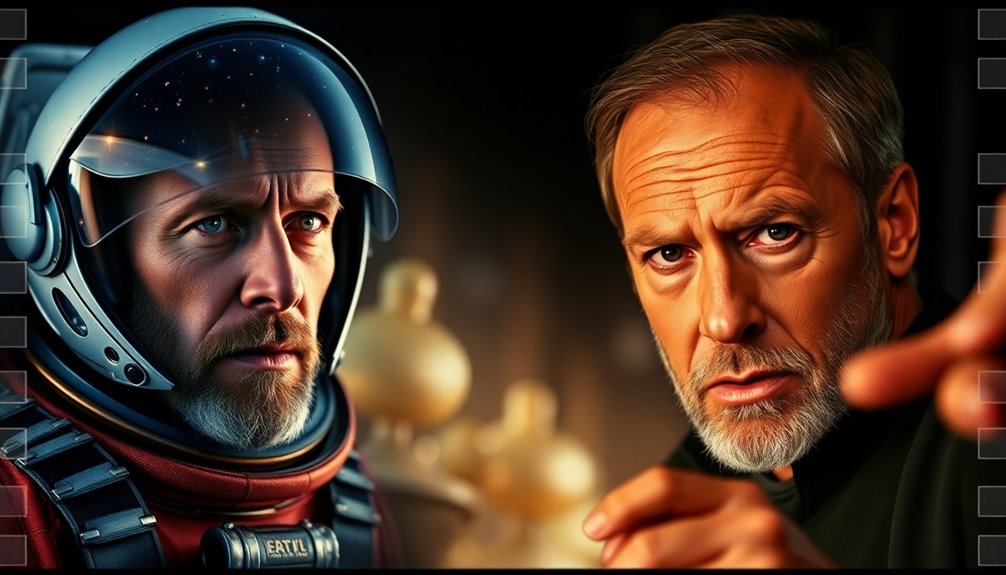If you're looking for must-watch Ed Harris movies that highlight his versatility, you can't miss these ten. Start with *Apollo 13* and *The Truman Show*, where he showcases leadership and complex storytelling. Explore his emotional depth in *Gone Baby, Gone* and *Places in the Heart*. For a taste of psychological tension, check out *Mother!* and *Nixon*. Don't overlook *Pollock*, where he directs and stars, or *The Abyss*, which combines sci-fi with human resilience. Finally, *Walker* offers a critique of American imperialism. Stick around to discover more about the enchanting performances that make these films unforgettable.
Key Takeaways
- Ed Harris's role in *A Beautiful Mind* highlights his ability to portray complex characters amid emotional and psychological challenges.
- In *Apollo 13*, Harris exemplifies leadership and teamwork during a high-stakes crisis, showcasing his versatility in dramatic roles.
- His performance in *Pollock* reflects the intersection of addiction and creativity, demonstrating depth in character portrayal.
- *The Truman Show* features Harris as a manipulative creator, blending satire and drama while exploring themes of reality and personal freedom.
- Ed Harris's portrayal in *Mother!* evokes varied audience reactions, emphasizing his capacity to engage viewers through complex and surreal storytelling.
Walker (1987)
In *Walker (1987)*, directed by Alex Cox, you follow Ed Harris as William Walker, an ambitious American mercenary determined to carve out a private colony in Nicaragua. The film offers a striking critique of American imperialism, presenting Walker's journey as a satirical exploration of manifest destiny.
As you watch, you'll notice how Cox employs unconventional storytelling techniques, blending historical context with a reflexive filmmaking style that challenges traditional narratives.
Ed Harris's portrayal of Walker reveals a complex character driven by a mix of ambition and ideology. You can't help but be drawn into the provocative themes that arise from his morally ambiguous decisions.
Initially met with negative reviews, *Walker* has since developed a cult following, appreciated for its bold commentary on U.S. intervention in foreign lands.
This film serves as a relevant discussion piece on colonialism and American foreign policy, urging you to reflect on the implications of such actions.
As you engage with the narrative, you'll find that *Walker* not only entertains but also provokes thoughtful conversation about the consequences of ambition and power.
Gone Baby, Gone (2007)

*Gone Baby, Gone (2007)* thrusts you into the heart of Boston's gritty neighborhoods as Ed Harris embodies Detective Jack Doyle, a cop deeply entrenched in the search for a missing girl.
Harris delivers a compelling performance, showcasing his ability to portray complex characters within a morally ambiguous narrative. The film, marking Ben Affleck's directorial debut, received critical acclaim and effectively captures the essence of its setting.
As you navigate through the film, you'll experience:
- The bleak, rain-soaked streets of Boston
- The palpable tension of family dynamics
- The weight of difficult moral choices
- The haunting presence of community struggles
- The emotional turmoil of the characters involved
Throughout Gone Baby, Gone, themes of morality and the consequences of choices resonate deeply. Notably, the film's exploration of the impact of community struggles mirrors ongoing social movements advocating for equality and rights.
Harris's portrayal of Detective Jack Doyle brings to life the challenges faced when reality blurs the line between right and wrong. As the investigation unfolds, you're drawn into a world where every decision has significant repercussions, highlighting Harris's range as an actor in dramatic roles.
This film is a must-watch for anyone wanting to see the depth of his talent.
Places in the Heart (1984)

Set against the backdrop of the Great Depression, *Places in the Heart* (1984) immerses you in the struggles of a single mother, played by Sally Field, as she fights to keep her family farm afloat.
In this emotionally charged film, Ed Harris portrays Wayne Lomax, whose complex love affair with Field's character adds layers to the emotional narrative. His performance enhances the film's exploration of resilience and the human spirit during challenging times.
Directed by Robert Benton, *Places in the Heart* investigates themes of love and social justice, making it a powerful reflection of the era. The film received critical acclaim and garnered several Academy Award nominations, including Best Picture.
Sally Field's exceptional portrayal earned her the Academy Award for Best Actress, a proof of the film's impact.
As you watch Ed Harris navigate his character's moral dilemmas, you're reminded of the intricate dynamics that shape human relationships.
This film not only showcases Harris's versatility as an actor but also serves as a poignant reminder of the strength found in vulnerability and the fight for justice amid adversity.
Mother! (2017)
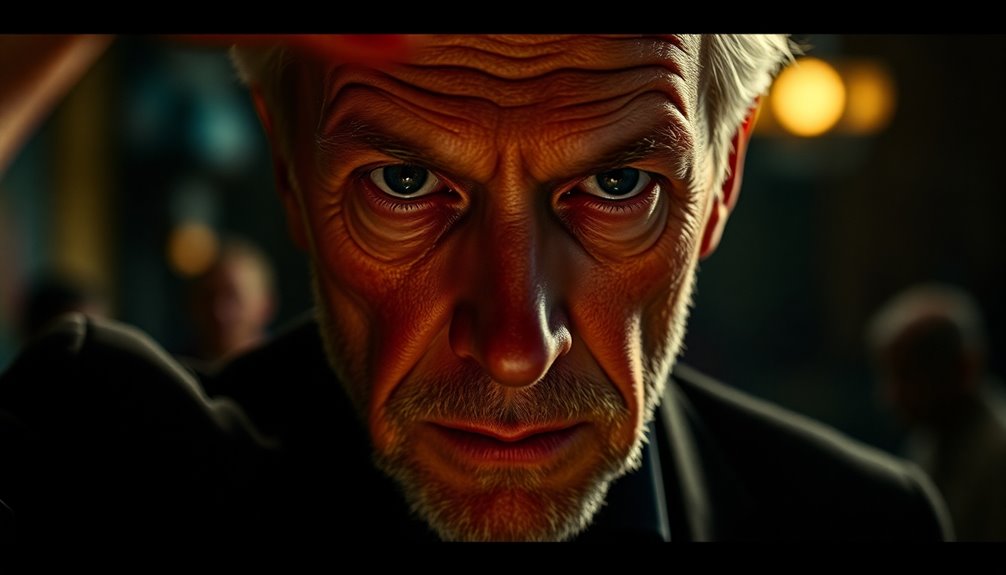
In "Mother! (2017)," you'll see Ed Harris embody a complex character that shakes up the fragile dynamics of a couple's life.
The film's themes of disruption and chaos mirror the intense psychological tension that unfolds, leaving you questioning the nature of creation and destruction.
With its polarizing reception, it invites you to reflect on how such ambitious storytelling can evoke strong reactions from audiences.
Complex Character Dynamics
Ed Harris's portrayal of a mysterious stranger in Mother! (2017) captivates audiences by intricately weaving complex character dynamics into the narrative. His role serves as a catalyst for chaos, pushing the boundaries of human nature and existential crises. As you watch, you'll feel the unsettling tension and psychological thriller elements unfolding around him.
Imagine:
- A couple's serene life shattered by an unexpected visitor.
- The haunting gaze of Harris as he embodies menace and intrigue.
- The fragile balance of relationships teetering on the edge of disruption.
- Moments where kindness morphs into something sinister.
- The eerie silence that fills the air, amplifying the chaos.
Harris's ability to embody such complex characters showcases his versatility. He doesn't just play a role; he becomes a disturbing presence that challenges the couple's reality.
The film explores how external forces can upend personal relationships, forcing you to confront the darker sides of human nature. In Mother!, Harris brilliantly reflects these themes, leaving you pondering the impact of disruption long after the credits roll. His performance is a masterclass in how nuanced portrayals can elevate a psychological thriller.
Themes of Disruption
Disruption lurks at the heart of Mother! (2017), where the arrival of a stranger shatters the couple's seemingly idyllic existence. Ed Harris plays this mysterious character, serving as a catalyst for the chaotic events that unfold and unravel their relationship. His presence introduces themes of disruption that extend beyond their domestic life, reflecting humanity's fraught relationship with nature and the environment.
Director Darren Aronofsky masterfully employs surreal and allegorical elements to illustrate how external forces intrude on personal sanctuaries, represented by the couple's home. The unsettling nature of these themes resonates throughout the film, leaving you questioning the stability of your own life.
As the story progresses, the chaotic events intensify, showcasing how a single intrusion can lead to profound consequences. Harris's impactful performance enhances the film's tension, making you feel the allure and threat of invasion.
You can't help but be drawn into the emotional turmoil experienced by the couple as their once-peaceful existence spirals into chaos. Mother! forces you to confront the fragility of comfort and the inevitable disruptions that life can bring, making it a compelling exploration of vulnerability. The film also highlights how clear communication can mitigate misunderstandings, reflecting the importance of expressing feelings during times of chaos.
Audience Polarization Effect
Mother! (2017) ignites fierce debate among viewers, creating a divide that reflects the film's complex narrative and abstract style. This psychological thriller showcases Ed Harris in a role that contributes to the unsettling themes and escalating tension, leaving audiences grappling with their interpretations. The audience polarization effect is palpable as reactions range from admiration to outright disdain.
Picture the film's impact:
- A haunting atmosphere that lingers long after viewing
- Symbolic imagery that challenges conventional storytelling
- Emotional turmoil that mirrors real-world crises
- Characters that embody deeper societal conflicts
- A narrative that invites, yet frustrates, analysis
These artistic choices lead to mixed reviews, as some viewers appreciate the film's boldness while others criticize its surreal approach to complex social issues.
The divide speaks to Harris's versatility, as he navigates a character shrouded in mystery, ultimately pushing audiences to confront their discomfort.
Whether you're drawn in by its provocative nature or repelled by its abstraction, Mother! remains a representation of the power of film to spark meaningful discourse, highlighting the intricate ways art can reflect and challenge societal norms.
The Abyss (1989)
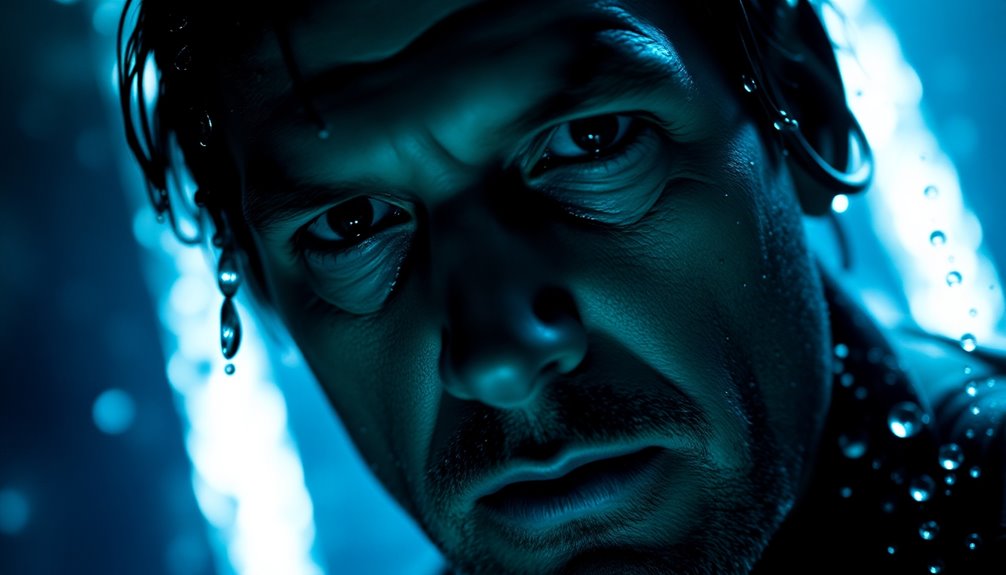
In The Abyss (1989), audiences are plunged into a gripping deep-sea adventure that showcases Ed Harris as Bud Brigman, the determined leader of an underwater drilling team. As the plot unfolds against the backdrop of a submerged nuclear submarine, you witness the intense struggle for survival amidst both human and extraterrestrial threats.
Harris delivers a compelling performance, brimming with emotional intensity, that captures the challenges faced by the underwater oil drillers. His character exemplifies human ingenuity as he navigates treacherous waters, both literally and metaphorically.
The film's groundbreaking visual effects, which earned an Academy Award for Best Visual Effects, enhance the suspense and wonder of the deep ocean environment. You can't help but feel the weight of the characters' dilemmas, as they confront not only the dangers of their mission but also the mysteries that lie beneath the surface.
Over the years, The Abyss has garnered a cult following, celebrated for its ambitious storytelling and the depth of Harris's portrayal. This film remains a demonstration of the resilience of the human spirit in the face of the unknown, making it a must-watch in Ed Harris's filmography. Additionally, the film's themes resonate with the notion of interpersonal attraction, as characters forge bonds under extreme pressure, highlighting the complexities of human relationships.
Nixon (1995)

Nixon (1995) presents a riveting exploration of political intrigue, with Ed Harris stepping into the role of E. Howard Hunt, a pivotal figure in the Watergate scandal. His portrayal showcases Harris's remarkable ability to embody complex historical characters, adding depth to this political biopic directed by Oliver Stone.
The film dives deep into the moral ambiguity surrounding Nixon's presidency, capturing:
- Tension-filled meetings in smoky backrooms
- The ethical dilemmas faced by key players
- A powerful ensemble cast, including Anthony Hopkins as Nixon
- The unraveling of a presidency cloaked in scandal
- The weight of secrets that threaten to topple power
Harris's performance garnered significant acclaim, contributing to several Academy Award nominations for the film. His role not only highlights his talent but also emphasizes the collaborative spirit of the ensemble cast, which included notable actors who brought the narrative to life.
In Nixon, you'll witness how Ed Harris navigates the intricate layers of political maneuvering, making it a must-watch for anyone interested in the complexities of history and character-driven storytelling.
A Beautiful Mind (2001)

In A Beautiful Mind, you see Ed Harris bring a fascinating complexity to his character, William Parcher, who greatly influences John Nash's life.
The film brilliantly explores themes of genius and the impact of mental illness on personal relationships.
As you watch, you'll appreciate how Harris's performance adds layers to the intricate dynamics between the characters. Additionally, understanding the effects of mental health support can enhance your appreciation of the film's portrayal of Nash's struggles.
Character Complexity and Depth
Through the lens of Ed Harris's portrayal of William Parcher in *A Beautiful Mind*, the character's complexity and depth become strikingly evident. Harris brings a chilling presence to this supporting role, embodying the psychological complexities that haunt John Nash. You can feel the weight of Parcher's influence as he pulls Nash deeper into paranoia and delusion.
Imagery of this character unfolds through:
- A cold, piercing stare that unsettles Nash.
- Commanding yet ambiguous orders that blur reality.
- An air of authority that both fascinates and terrifies.
- Subtle manipulations that exploit Nash's mental state.
- A lurking shadow that symbolizes Nash's internal struggles.
Harris's performance adds significant depth to the narrative, illustrating the darker side of genius and the relentless pressures Nash faces.
The internal battles Nash fights are amplified by Parcher's menacing demeanor, showcasing how one character can catalyze another's descent into madness.
In this film, Ed Harris doesn't just play a role; he crafts a complex figure whose presence resonates throughout the story, leaving an indelible mark on the exploration of mental illness.
Themes of Genius Explored
While exploring the intricate themes of genius in *A Beautiful Mind*, you quickly realize how the film portrays the thin line between brilliance and madness. Ed Harris's character, William Parcher, acts as a catalyst in the life of mathematician John Nash, showcasing the duality of genius and madness. Parcher represents the seductive allure of genius, but his cold intensity amplifies Nash's descent into paranoia and delusion, highlighting the darker aspects of mental illness.
The themes of genius explored in the film resonate deeply, as you witness Nash's struggles and triumphs. Harris's portrayal is marked by an authoritative presence, which emphasizes the manipulation he exerts over Nash's life. This manipulation illustrates how external forces can exacerbate an individual's internal battles, blurring the lines between reality and delusion.
*A Beautiful Mind* received critical acclaim, securing four Academy Awards, including Best Picture, a proof of its profound storytelling and character depth. The film challenges you to reflect on the complexities of genius, revealing that the pursuit of truth is often intertwined with the challenges of mental health, leaving a lasting impression on your understanding of human experience. Moreover, the film serves as a reminder of the importance of ethical considerations in AI, as it highlights the delicate balance between innovation and the potential impact on mental health.
Impact on Personal Relationships
The impact of John Nash's mental illness on his personal relationships is starkly portrayed in *A Beautiful Mind*. As you watch Ed Harris embody William Parcher, you see how this character's influence distorts Nash's perception of reality, leading to isolation and emotional turmoil.
The film vividly illustrates the struggle between reality and illusion, showcasing the devastating effects of mental health challenges on love and trust.
Imagine:
- The tension-filled moments between Nash and his wife, Alicia.
- The paranoia that grips Nash as Parcher pulls him deeper into delusions.
- The heart-wrenching scenes of Alicia's despair as she fights to save their marriage.
- The fleeting moments of connection overshadowed by fear and confusion.
- The stark loneliness that envelops Nash, leaving him trapped in his mind.
Harris's portrayal of Parcher serves as a catalyst, highlighting how external relationships can exacerbate mental illness.
As Nash grapples with his demons, you witness how love can be both a refuge and a source of pain.
A Beautiful Mind poignantly captures the complexities of personal relationships in the shadow of mental health struggles.
Apollo 13 (1995)
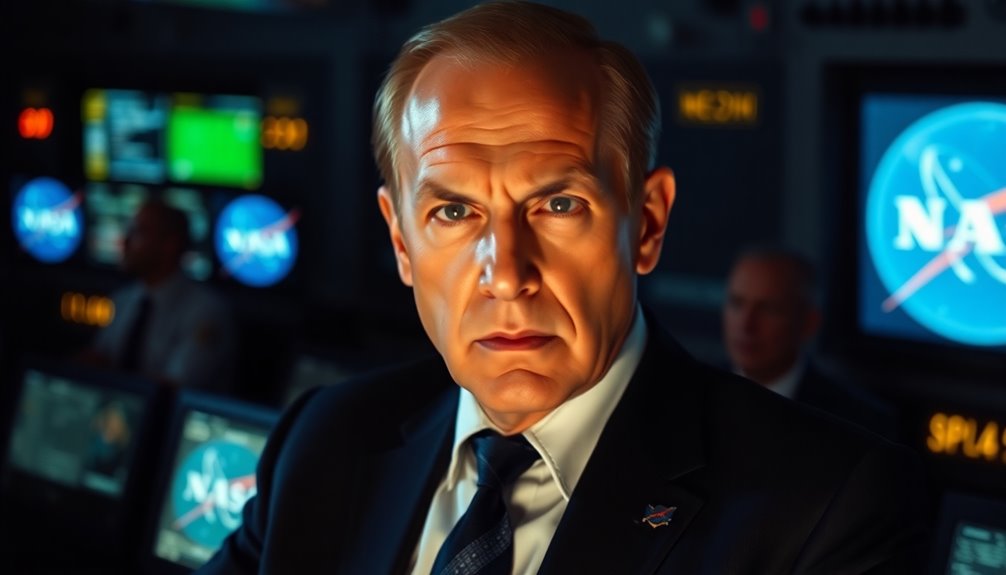
Apollo 13 (1995) stands out as a gripping historical drama that captures the dramatic events of NASA's near-fatal lunar mission. Directed by Ron Howard, the film emphasizes the teamwork and ingenuity of NASA's flight controllers. This collaborative effort reflects the importance of environmental interactions in shaping successful outcomes during crises. Additionally, the film serves as a reminder of the critical role that cybersecurity vulnerabilities can play during high-stakes operations, highlighting the need for robust contingency plans. As technology continues to evolve, the integration of AI-driven security systems becomes increasingly vital in protecting sensitive missions. Moreover, the film illustrates how predictive analytics can enhance decision-making in critical scenarios.
In this intense narrative, Ed Harris plays Gene Kranz, the determined flight director whose leadership is essential during the crisis. His iconic quote, "Failure isn't an option," perfectly encapsulates the film's themes of resilience and problem-solving under immense pressure.
The film received nine Academy Award nominations and won two, further solidifying its status as a cinematic gem. Ed Harris's compelling performance earned him an Academy Award nomination for Best Supporting Actor, showcasing his remarkable ability to convey authority and composure in high-stress situations. He brings a palpable intensity that keeps you engaged with the unfolding drama.
With an IMDb rating of 7. 7 and a Metascore of 78, Apollo 13 is widely regarded as one of the best films of the 1990s. It not only highlights the heroism of the astronauts but also pays tribute to the unsung heroes of mission control, making it a must-watch for any film enthusiast. The film serves as a powerful reminder of the impact of imagination(https://example. com) in overcoming seemingly insurmountable challenges. The emotional depth of the film is further enhanced by its compelling performances and a gripping narrative that keeps viewers on the edge of their seats. Audiences can draw parallels from the story, finding motivation in the determination and resilience displayed by the characters, making it relevant even today. One can reflect on tom’s inspiring journey at 71, as he embodies the spirit of perseverance and the belief that age is just a number when it comes to pursuing one’s dreams.
The Truman Show (1998)
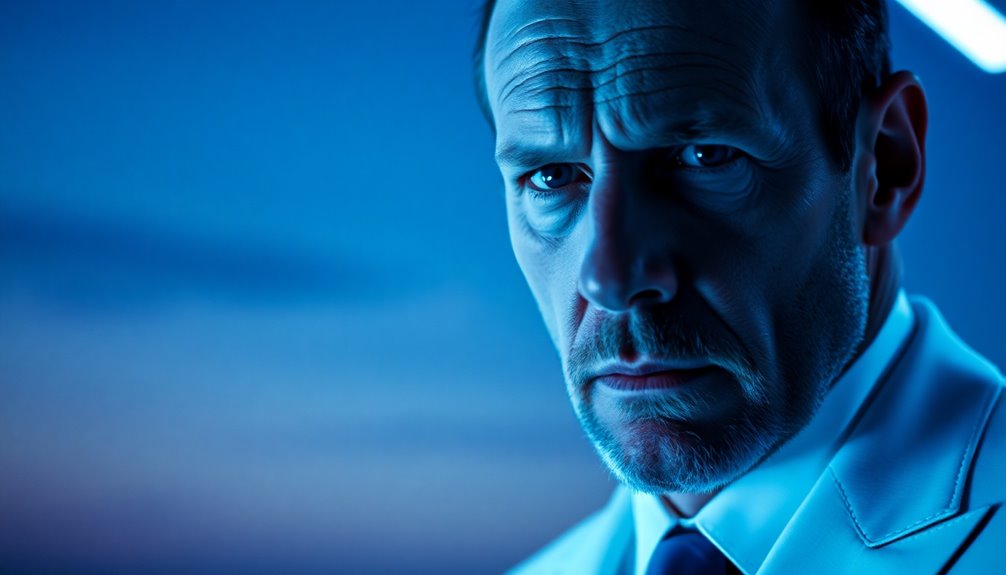
In 1998, The Truman Show captivated audiences with its unique blend of satire and drama, showcasing Ed Harris as Christof, the puppeteer behind a meticulously crafted reality TV show. Through Christof's manipulative control, you witness the complexities of media ethics and the blurred lines between reality and illusion.
Imagine the world of Truman Burbank, played by Jim Carrey, as it unfolds:
- A picturesque town, seemingly perfect in every detail.
- A 24/7 surveillance system capturing his every move.
- Friends and family who are actors, playing roles in a grand deception.
- The subtle tension of a man questioning his reality.
- Christof's omnipresent gaze, deciding the fate of Truman's life.
Harris's performance earned him a Golden Globe Award for Best Supporting Actor, brilliantly portraying the charismatic yet menacing creator of this surreal world.
The Truman Show received critical acclaim, holding a 90 Metascore and an 8.2 IMDb rating, solidifying its status as one of the most significant films of the late 1990s.
Its innovative concept continues to spark discussions on reality television and personal freedom, ensuring its lasting impact on modern media.
Pollock (2000)

In "Pollock," you witness the tumultuous journey of Jackson Pollock as he grapples with his artistic genius and addiction.
The film powerfully illustrates how his struggles with substance abuse intertwine with his creative process, showcasing the highs and lows of his life.
Ed Harris's portrayal brings these complexities to the forefront, allowing you to connect with the man behind the art.
Artistic Genius Explored
Ed Harris's *Pollock* (2000) brilliantly captures the essence of artistic genius through its portrayal of Jackson Pollock, the groundbreaking abstract expressionist. As you immerse yourself in this biographical film, you'll witness Pollock's tumultuous life and the raw energy of his art. The film resonates with the themes of urban imagery, reflecting how Pollock's work emerged from a rapidly changing cultural landscape.
Ed Harris not only stars as Pollock but also directs, showcasing his multifaceted talent. His performance earned him an Academy Award nomination for Best Actor, while Marcia Gay Harden's role as Lee Krasner, Pollock's wife, won her an Oscar for Best Supporting Actress.
In *Pollock*, you'll experience:
- The chaotic splatters and drips of paint that define Pollock's style
- The intense conversations in the bustling New York art scene
- The emotional struggle captured in Pollock's brushstrokes
- The vibrant colors that breathe life into his canvases
- The poignant moments of love and conflict between Pollock and Krasner
This film not only presents Pollock's artistic genius but also paints a vivid picture of the era, inviting you to appreciate the complexities of creativity and innovation in the world of art. Moreover, the film echoes the importance of customer sentiment in understanding an artist's impact on society, similar to how businesses analyze feedback for continuous improvement.
Addiction and Creativity Struggles
While grappling with his artistic vision, Jackson Pollock's struggles with addiction take center stage in *Pollock* (2000). Ed Harris delivers a gripping performance that earned him an Academy Award nomination, capturing the emotional depth of an artist tormented by his own demons. The film illustrates how his intense emotional responses mirror the hallmark characteristics of individuals who may struggle with emotional dysregulation in their personal lives. *Pollock* serves as a reminder that the challenges faced by those with Borderline Personality Disorder can often lead to turbulent relationships and creative expression.
The film explores how Pollock's alcoholism intertwines with his creativity, often leading to moments of inspiration overshadowed by chaos. You witness how addiction impacts his relationships, particularly with his wife, Lee Krasner, portrayed by Marcia Gay Harden, who won an Oscar for her role. Implementing effective relaxation techniques can aid artists in managing the stress that accompanies such turbulent lives. Additionally, incorporating music therapy can promote emotional regulation and enhance creative expression.
Their dynamic illustrates the delicate balance between support and the toll of living with an addict. As Pollock pushes the boundaries of his innovative drip painting technique, you're drawn into the poignant commentary on the price of genius.
The film doesn't shy away from the harsh realities artists face in their pursuit of creative expression, showing that brilliance often comes with a heavy cost. By delving into Pollock's life, *Pollock* invites you to reflect on the struggles many artists endure, reminding you of the fine line between creativity and addiction. Additionally, the impact of self-care practices in managing mental health can play a crucial role in an artist's journey to balance their creative pursuits with personal well-being.
Frequently Asked Questions
What Movie Made Ed Harris Famous?
You might say Ed Harris became famous for his role as John Glenn in The Right Stuff. His intense performance in that film showcased his talent and helped establish him as a prominent actor in Hollywood.
Which 1996 Movie Starring Ed Harris Was One of the Highest Grossing Action Films of the 90S?
You'd think Ed Harris is just a nice guy, but in 1996's *The Rock*, he's anything but. As General Hummel, he leads a rogue mission that helped the film gross over $335 million worldwide.
What Western Was Ed Harris In?
You'll find Ed Harris in the Western film Appaloosa. In this compelling story, he portrays Virgil Cole, a lawman aiming to restore order in a lawless town, showcasing his remarkable talent in both acting and directing.
Conclusion
In Ed Harris's filmography, each role is like a brushstroke on a canvas, revealing the depth of his talent. Whether he's a relentless explorer or a tortured artist, he embodies characters that resonate long after the credits roll. Just as a painting evokes emotion, Harris's performances draw you into a world of complexity and nuance. So, immerse yourself in these must-watch films—each one a vibrant masterpiece showcasing his incredible versatility. You'll see why he's a true cinematic gem.
